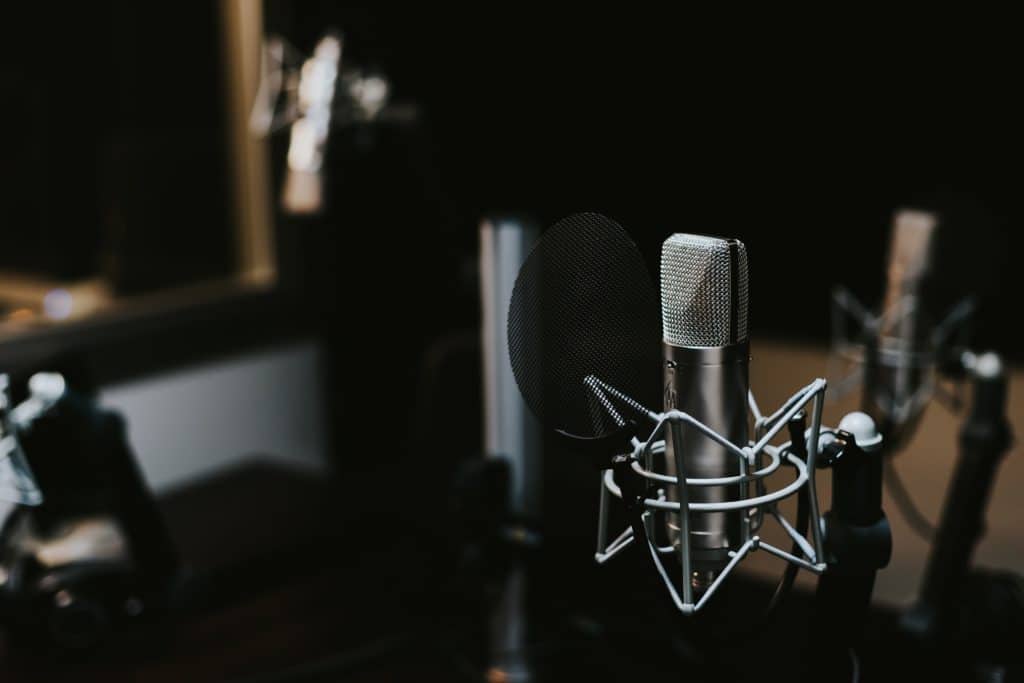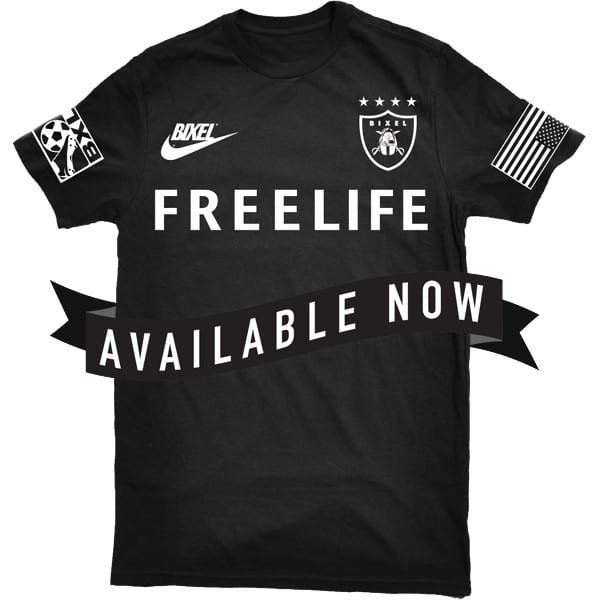Whether you’re looking to make some extra cash on the side or you want a full-time career, it’s easier than ever to make money as a music producer.
However, many producers don’t know where to begin to start making money off their music.
In this article, we’ll look at 20 different ways to turn your passion for music into a sustainable career.
We’ll look at what these different revenue streams are, who they are for, and most importantly, how to get started.
New to music production? 🧑💻
Watch our Free Masterclass on how to learn electronic music production the smart way (without months of confusion & frustration) 👇
Production
1. Music Sales/Streaming Royalties
The first and likely the most obvious stream of income is music sales and streaming royalties.
And by music sales and streaming royalties, I really mean just streaming royalties. Unless you’re a Top 40 artist or make a style that sells well on Beatport, music sales in 2018 are next to nothing.
However, streaming royalties are an increasingly viable option for artists.
Who’s it for?
Making a career off of streaming royalties is the ideal situation for most artists: you make a song, and somebody gives you money for that song.
It’s important to keep in mind that the streaming market favors certain styles of music. Even though heavier music is a central part of the festival/club scene, it doesn’t do well on Spotify and Apple Music.
Pop-friendly styles of EDM do extremely well on streaming sites, as do certain instrumental and downtempo styles (check Spotify’s Brain Food Playlist).
How do you get started?
Step one: have music that people want to listen to.
This is an obvious point, but essential for nearly every revenue stream we’ll look at in this article.
Outside that, there are several paths to gaining a sustainable income through streaming sites.
The traditional route is to have a strong artist project with a decent following that will stream your music.
If you’re clueless on how to get started on streaming sites like Spotify, check out this article from our friends over at Heroic.
Otherwise, connecting with a label is a great way to gain exposure for your music as they will typically have connections for placements on streaming sites.
The last element to consider is revenue splits. If you release a song on a label, they’ll take ~50% of the streaming royalties on that track. Managers will take more on top of that, as will any collaborators you work with. Not that you shouldn’t leverage these assets, but they’re important to consider when trying to make the most out of your streaming royalties (i.e. is the label push worth it, or should you go independent and keep 100% of the royalties).
What’s the pay?
Below is a fantastic graphic that explains the different royalty rates of the top streaming sites.

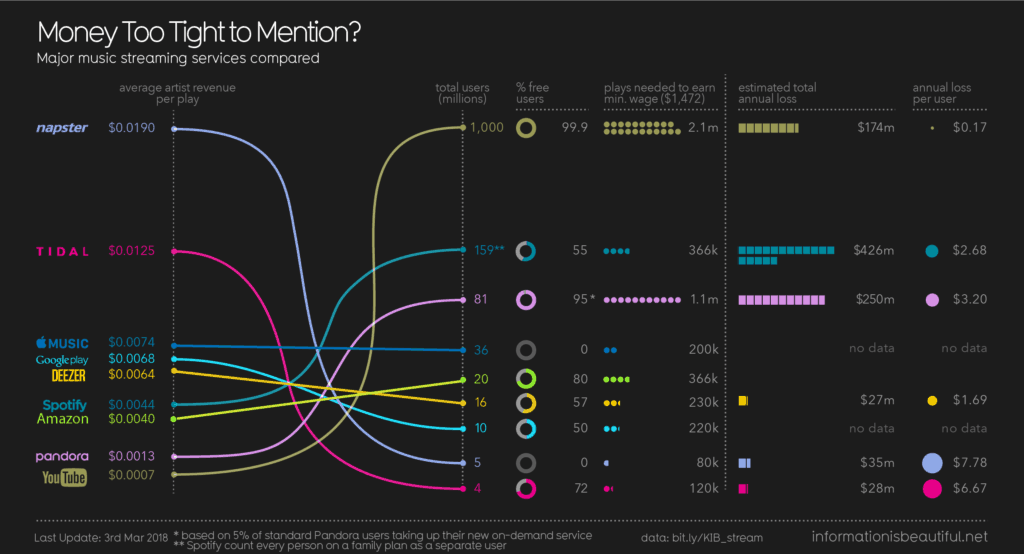
In other words, to make minimum wage ($1,472) through streaming alone, you will need:
- 200k streams per month on Apple Music
- 336k streams per month on Spotify
- 2.1m streams per month on Youtube (which by the way, is the largest streaming site)
2. Sync Licensing
What is sync licensing?
Sync licensing, or “Synchronization,” refers to the use of music in films, TV shows, commercials, video games, presentations, YouTube videos, or anything else where a song is “synced” to moving images.
When a song is licensed for sync, a fee is paid to the songwriter/publisher for the usage of the underlying composition, AND to the copyrighter owner of the master recording for the use of the track.
If you wrote the song and haven’t sold the rights, you are the publisher. If you own the recording you are the copyright holder. In this case you would get paid both royalties – via CDBaby.com
Think about: nearly every piece of video content needs music. Sync licensing is an amazing way to make money of the music you’ve already made (even if it’s not amazing music).
Who’s it for?
Stylistically, sync licensing is for just about everyone. It leans towards more user-friendly styles of music, but even heavier and more esoteric genres have a place in the sync licensing world.
How do you get started?
We have two great podcast episodes on sync licensing. The first is with James Ruehlmann, who breaks down the basics about how to get started.
The second is with Travis Terrell, who runs a sync licensing company called Soundstripe.
To get into sync licensing, there are two steps you’ll need to take.
First, you need a body of music to liscense.
If you already have a good backlog of music (10+tracks), that will be plenty to get you started.
Many professional sync artists will create albums exclusively for sync libraries, which is something James Ruehlmann talked about in the podcast linked above.
Second, you’ll likely want to connect with a sync licensing company.
There are different types of sync licensing companies, but all of them will act as the middleman between you and somebody who wants to use your music.
Here are a few companies to look into:
Sync licensing is something you can get into independently, although it is difficult. You can start by leveraging the creators in your network (filmmakers, YouTubers, video game designers), or link up with a manager who is well connected in this industry.
What’s the pay?
The pay for sync licensing varies heavily. The dream for most artists is to get that $10,000+ sync deal for landing a spot in a major motion picture, but that’s too rare to count on.
I view sync licensing as setting up a side project. Essentially, take the music you are already making, and put it in a place where it can make money. Some months it might make next to nothing, while others it could add a few thousand dollars on top of your income elsewhere. In other words, it’s an easy way to make a lot of money with little effort, but shouldn’t necessarily be counted on as your main source of income.
3. Production For Other Artists
Producing for other artists is a great source of income. Even though music production has become increasingly accessible, plenty of artists still need someone to produce their music.
Who’s it for?
This path is great for producers who want to make money making music, and are willing to help other artists see out their creative vision.
How do you get started?
Your body of work, whether it’s released or unreleased, is your resume. Before you connect with other artists, be sure to have at least a small body of work you’re comfortable with sharing.
Artists are also more likely to work with you if you have a moderately successful artist project. It’s not a dealbreaker, but something to think about.
The best way to get started is to connect with artists who might need production. If you’re newer, leverage your circle of friends to find someone who might need production (like your friend’s friend who is a rapper, or that singer from the school musical). It’s also great to start local, as it’s easier to build these connections in person.
The next level up is to reach out to medium size artists. If your music is good, they’ll be willing to connect with you. Find artists you’d like to work with, then send them your portfolio in a friendly email.
Lastly, you can connect with a studio that offers production services. The classic route is to land an internship, which is not as hard to come by as you might think.
What’s the pay?
The pay will vary depending on the client and your experience/credits. It shouldn’t, and some will disagree with me, but that’s the current state of the industry.
How much you should charge is specific to you and the work you are doing.
Roughly speaking, you can expect $200-$1000 per track. The fee increases/decreases based on their clout, your experience, and how much work the track needs. Royalties come into play as well, which will increase your potential earnings from a gig.
Here’s a great article to learn more about becoming a “traditional” music producer.
4. Ghost Production
Ghost production is the secret world of producers who make music for other producers who say they are producers but aren’t producers.
The premise is simple: another artist pays you to produce a track that they can claim as their own.
Who’s it for?
Ghost production seems like a great stream of income because you’re making a career from producing music.
In reality, you’ll need to sacrifice a bit of your artist project by spending time producing for other artists.
A full-time career in ghost production is possible, but isn’t for everyone. If you like making more DJ/commercial friendly styles of electronic music, and sincerely don’t want to pursue an artist project, ghost production is a great option.
However, it can also be treated as a side-income, where you make 1-2 tracks per month for other artists. In a perfect situation, you can sell tracks you’ve made but don’t want to release. In reality, most ghost production clients will want you to produce the style that they want.
How do you get started?
There are two paths: build the connections on your own, or connect with a production company that provides those services.
To build your own connections, you can start by leveraging your existing network to find artists who need production.
One of the easiest ways to get into ghost production is to offer it as service in connection with a successful artist project. I know a few artists with 5-10k on social media who mention in their Soundcloud bio that they offer ghost production. This works well because people can hear your music, see that it has plays, and want you to make music for them.
This isn’t to say you can’t ghost-produce without a successful artist project, but it is considerably easier and will allow you to charge a bit more.
What’s the pay?
Similar to the section above, the pay scale will vary based on a number of factors. Roughly speaking, you’re looking at $250-$1000 per track.
New to music production? 🧑💻
Watch our Free Masterclass on how to learn electronic music production the smart way (without months of confusion & frustration) 👇
5. Instrumentals/Beats
Another revenue stream is to create instrumentals/beats for other artists to buy off of you. This is similar to the previous method of producing for other artists, but unique in that instead of collaborating with another artist, they buy a finished track off of you.
Who’s it for?
Producers who are great at pumping out tracks. The more music you make, the more content you have the sell, and the higher your sales will be. As always, you’ll need to have a base level quality, and ideally you enjoy producing a more beat oriented style.
How do you get started?
Robin Wesley from Urban Masterclass has a fantastic article on how to sell your beats online. Rather then try to summarize his article, I’ll leave you to check it out if you’re curious on what it takes to make a living off of selling beats online.
What’s the pay?
Robin Wesley’s article talks about this in detail, but in short, if you treat it like a career, you can make a full-time living off of selling beats.
He talks about the different ways you can sell beats (through a distributor or on your own site), and the different types of sales you can make (leases vs. exclusive).
Here’s a basic example: if your goal is to make $2,000 a month off of selling beats, and you charge $50 per beat, you’ll need 40 sales to make that $2,000 ($50 per lease x 50 purchase = $2000).
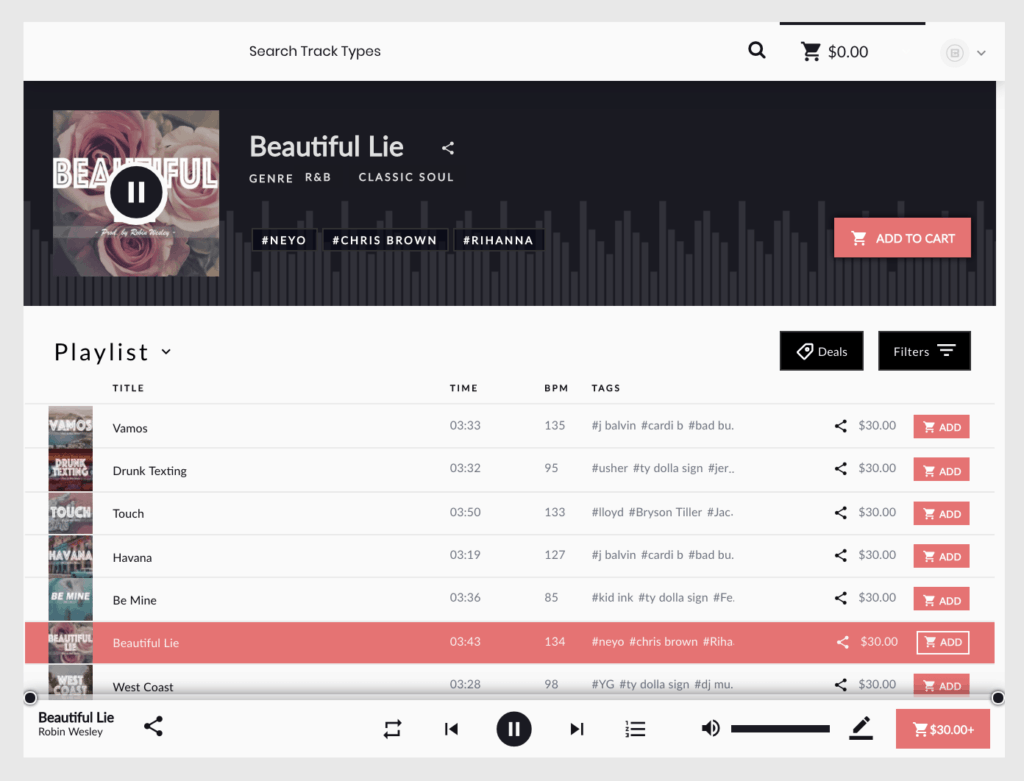
6. Video Game Composer
A video game composer can wear a number of number of different hats: writing original scores, creating sound effects, and recording and processing vocals and foley for video games.
Who’s it for?
Video game composition is a great career path for someone who is passionate about music production and passion about video games (and a fan of video game scores)
How do you get started?
First and foremost, you need to have a talent for the job and a portfolio of music worth sharing. This may mean creating a body of work specifically to show video game developers.
The most organic way to get into this scene is to connect with local video game developers. You can visit a local meetup/conference or connect with creators a video game developer forum specific. Reddit’s r/gamedev is a personal favorite of mine. To summarize: connect with video game developers who need music (all of them) and have a body of quality music ready.
The other way is to connect with a larger studio, via a internship or entry level position. This will very much be based on your location, but most major cities have at least one major developer studio.
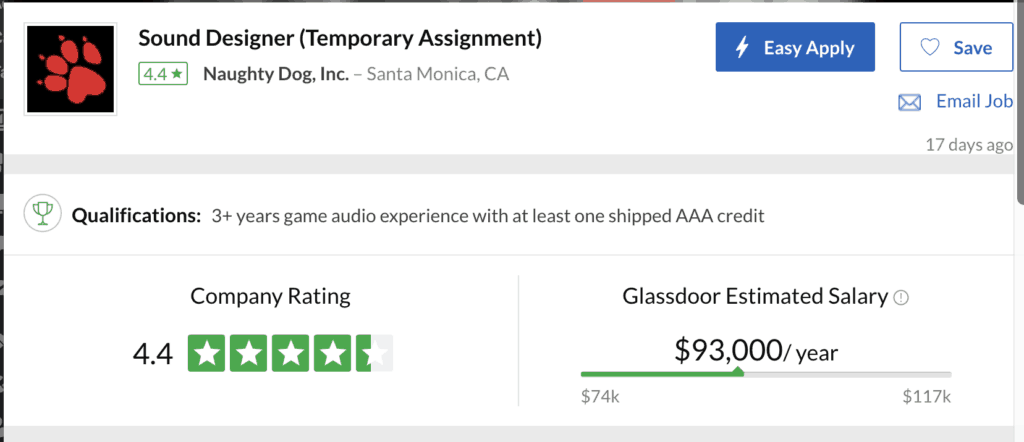
Job opening at Naughty Dog, Inc., home of the Uncharted and Last of Us Franchises
This book and this Youtube channel will help you along the way.
What’s the pay?
The revenue will depend on your involvement in the development of the music for each game and the size of the studio you are working with. A full-time video game composer can expect a salary between $40,000-$75,000. Outside of this, there are plenty of part-time opportunities that can make this a viable secondary source of income.
7. Sample Packs
Sample packs are one of the most common and most effective ways to make income as a producer. It’s a slight deviation from making money off of music (since you may be making drum sounds or bass shots), but it’s a great way to get paid while perfecting your craft.
Opportunities include:
- Creating construction kits/sample loops
- Creating drum libraries
- Creating preset packs
- Creating vocal packs
- Creating one-shot libraries
Visit Splice to see what packs they sell (and which ones sell well)
Who’s it for?
Creating sample packs is great for producers who are looking to make a moderate income making music. If you create a more popular genre of electronic music, it’s a great way to get paid to practice production (I like to call it production bootcamp)
How do you get started?
If you have an established artist project, you can sell sample packs directly to the consumer via sites like sellfy.com.
Otherwise, working through a sample pack label will give you more exposure, meaning more sales.
You can contact most sample pack companies directly via their websites. Look through Splice or Beatport sounds to find a label that fits your style/talents, then connect with them directly. These labels are always looking for more content, so if your music’s good, they’ll be happy to work with you. Most labels won’t care if you have an established artist project, so long as your catalogue of music is good, they’ll hire you.
What’s the pay?
Most labels will offer either buyouts or royalties. Buyouts typically yield less money, but you receive it immediately. In my experience, royalties typically earn 2-3x more money then buyouts.
As always, it will depend on the type and size of pack you are working on.
You can expect between $300-$2000 per pack, depending on the quality/size of the content. A Splice top 10 pack will earn you closer to $5k-$10k if you can make it there.
Engineering
8. Mixing/Mastering
A traditional and common path for producers is to become a mixing and mastering engineer. You likely already know what a mixing engineer does, so I won’t bore you with the details (click here is you don’t).
Who’s it for?
Engineering is great for more technical oriented producers that are great at finishing and polishing records. It’s great for producers who want to be around music for a living, and look forward to the idea of mixing other producers’ music.
First and foremost, you need the skills to be able to do it. Although traditional engineering schools exist, it is still a profession that can be self taught.
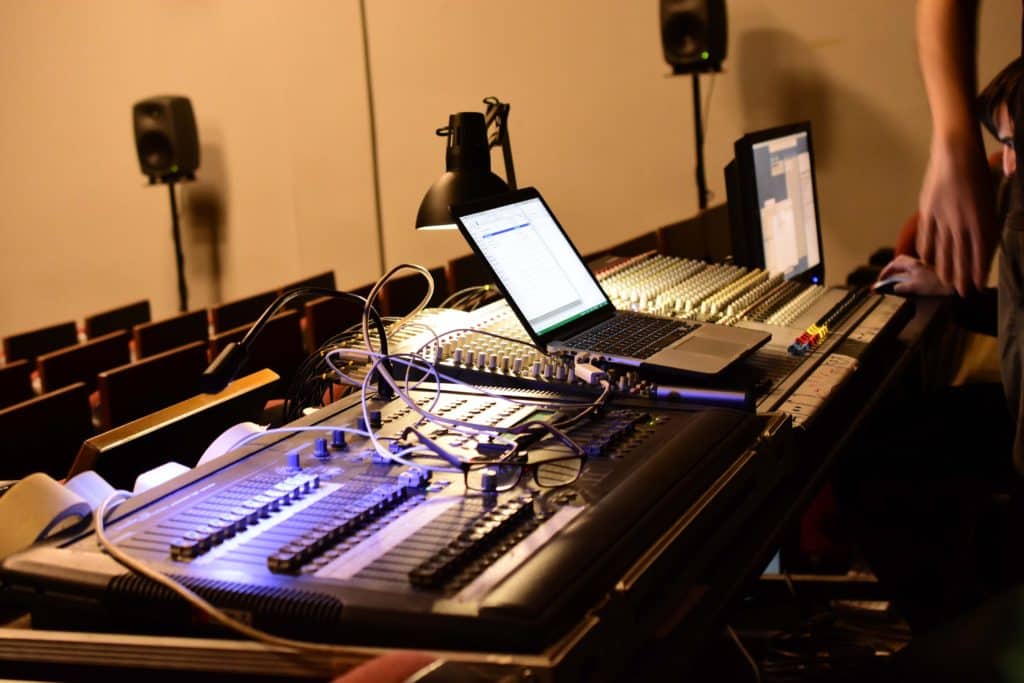
How do you get started?
If you’ve got the talent to mix records, you can start your own business. You can leverage your artist project, connect with artists in your area, or use a job site such as SoundBetter to connect with clients.
The traditional route is to find an internship at a recording studio. This is a great way to get your first step in the industry, as well an area for you to learn and develop your craft.
What’s the pay?
A full-time salaried engineer can expect to make on average ~$40,000-$70,000. Mixing rates will vary anywhere from $150-$1,000 per track, so it’s a good way to supplement your income with a few mixes/masters a month.
9. Recording Engineer
Recording is an art in itself, but a great opportunity for producers willing to learn how to record and engineer a record. The traditional path is to attend a recording school, but be wary of these as they’re a big investment. There are plenty of successful self-taught recording engineers.
Who’s it for?
Producers who want to be around music and like the idea of recording artists. Ideally, they already have experience in a traditional studio environment.
How do you get started?
Find an internship at a local studio or develop a home studio and connect with local artists.
What’s the pay?
Similar to mixing engineers, a full-time salaried recording engineer can expect to make ~$40,000-$70,000 on average. Many studio’s offer part time work as well ($1,000-$2,000 per month).
If you have a home-studio, you can record artists on the side. Full-band recording is great, but recording vocals for a fee in your home studio is a great (and easy) way to bring in some side income.
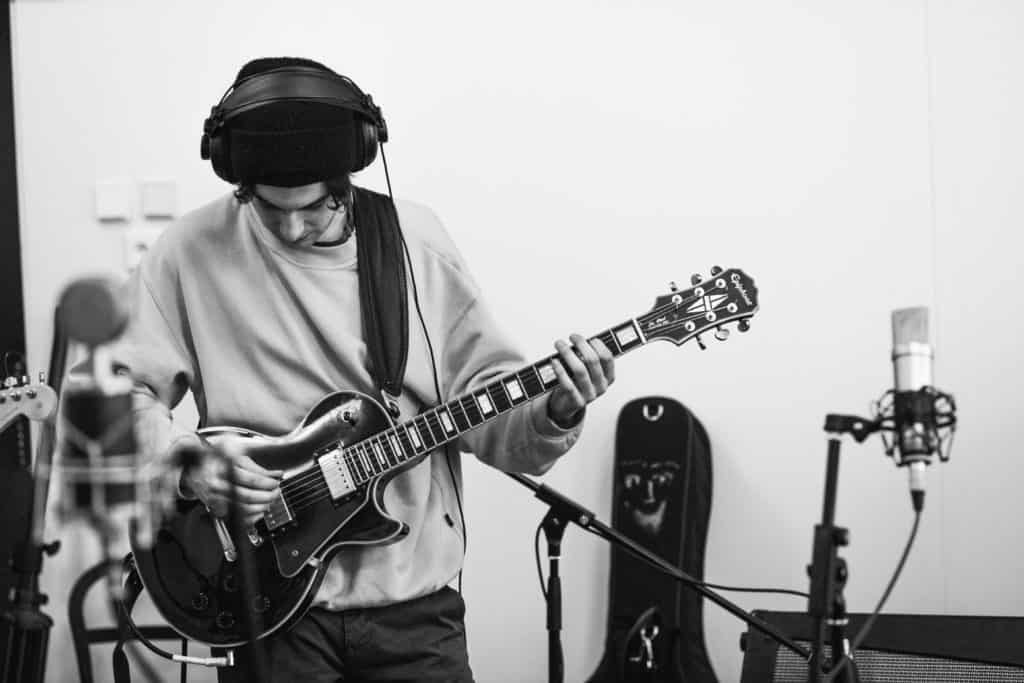
New to music production? 🧑💻
Watch our Free Masterclass on how to learn electronic music production the smart way (without months of confusion & frustration) 👇
Performance
10. Live Shows
The ideal revenue for most producers is live shows. Touring is a dream for many producers, as is the money that can come with it.
Although tough to come by, it can be a great source of income for producers. We’ll discuss alternative and more realistic options below.
Who’s it for?
Producers who are committed to touring and turning their artist project into a career.
How do you get started?
Most touring artists tour off of successful music. There are still touring DJ’s who are just DJ’s, but learning how to produce and getting good at production is a near must if you’re committed to the tour life.
Recommended: How To DJ
What’s the pay?
On a scale from that annoying kid you went to high school with to Marshmello, live shows can get you anywhere between $0 to $200,000 per show.
The artists at the top will make 5/6 digits per show, mid tier artists will net closer to $2500-$5000 per show, and smaller artists make closer to $500-$2,000 per show.
The fee will vary widely on the type and size of the venue, as well as the size of the artist.
11. Club DJ
If you’ve got good music taste and are willing to hustle, DJing in local clubs is a great way to make a living off of music while honing your craft and growing your network.
I won’t dive too deep into this because I’m sure you’re all familiar with club DJs, but if you aren’t, here’s a great article on what this career looks like .
Who’s it for?
This job is for producers who want a career in music but their quality isn’t at a professional level yet. It is also for people who can sustain the late night/weekend lifestyle.
How do you get started?
Step one: Know how to DJ.
Step two: Work your way up from the bottom in your local club circuit.
This process can be a grind, but if you stick it out, it can be a exciting and consistent way to make a living off of music.
You’ll likely start as the opener at the smallest club in your area, then, as you build trust and clout, you can play better slots at better clubs.
As mentioned above, there is a ceiling for being a local club DJ who doesn’t produce. However, it’s a fun opportunity while you work on developing your production quality.
What’s the pay?
Depending on the time slot, your following, and the size of the club, you can expect anywhere from $100-$1000 per night. It’s a great way to make supplemental income playing a show or two a week.
12. Commercial DJ
Commercial DJing isn’t the most glamorous career, but it’s a great way to make consistent income in music. This includes events such as weddings, birthday parties, and corporate events.
Who’s it for?
Producers who are committed to touring that want moderate and sustainable income in the music industry. Ideally, you already know how to DJ and you don’t mind just playing the hits.
How do you get started?
You can leverage your existing network to develop your own DJ business, use local job sourcing sites like Thumbtack, or connect with a local DJ agency who can book you gigs.
What’s the pay?
Commercial DJs will make around $200-$500 a night. If you do the math on the hourly rate, this can get you anywhere from $25 to $100 per hour.
Physical Content
13. Merchandise
You’d be surprised by the amount of money some artists make off of merchandise. In an era where paying for music is a radical idea, consumers still buy plenty of merchandise. Shirts, hats, hoodies, stickers and more all still sell extremely well.
To make money off of selling merchandise, you’ll need unique and interesting merchandise, as well as a platform to be able to sell that merchandise (i.e. a social media following).
If my producer friend from high school has wack beats but dope shirts, I’m way more likely to spend $30 on a shirt then $10 on his latest album.
Who’s it for?
Producers who have a network of people to sell merchandise too.
How do you get started?
First, you will need the physical content. There are companies that will design your clothing and others that will print it (most do both). As these companies charge high fees and are impersonal, you should look to connect with graphic artists and designers in your local area.
What’s the pay?
The profit margin on merchandise is great, so it’s a good source of income.
The numbers obviously vary based on your reach, so it’s difficult to give exact numbers.
From an artist project perspective, if you gain 500 new fans a month, and ten percent of them (50) buy a $30 shirt, that’s a $1500 month gross profit.
Education
15. Writing Articles
Writing articles is a great way to share your knowledge with other producers, all while putting some extra cash in your pocket. Even if you don’t have a successful artist project, you can get paid to share what knowledge you do know about music production.
Who’s it for?
Producers who have knowledge to share and are adept at teaching.
How do you get started?
You can reach out to blogs or companies that need educational content (Splice, LANDR, Cymatics, ADSR, DJTechTools) and look to see if they are hiring. Most them are looking to release additional content, so if your work is good, they’re likely to hire you.
Most will ask for a previous example of your work, so be prepared with a few articles you’ve written, even if none of them have been published.
What’s the pay?
The pay will vary based on your role as a writer. Some blogs offer more permanent part-time rolls, while others will pay based on the article. DJ Tech Tools has their pricing structure listed on their site if you’re curious to look at an example.
16. Courses/Educational Materials
Selling courses and other education materials can be great source of steady income (selling courses is what funds all of the free articles on EDMProd). Rather then get lost in the depths of YouTube, many producers choose to accelerate their growth with high value education resources. Thus, their is a market for actionable, high-quality educational content for music producers.
Who’s it for?
If you have a good production knowledge and are adept at explaining production concepts, creating courses could be a great fit for you. It also helps to have a passion for teaching (as Sam and I both do).
How do you get started?
As with most of these options, you can either go independent or work with an established company.
Independent means developing a network of people to sell to, which is a process easier said than done. There are plenty of books and courses on how to develop and monetize an online business, so if you’re interested, get Googling.
Outside of that, you can connect with companies such as ADSR, Lynda, and Sonic Academy to develop a course in partnership with them. They’ll take a cut of the sales, but will (likely) have a larger reach then you will on your own.
What’s the pay?
The pay will depend on a number of factors, mainly the cost of the course as well as the platform you release it on.
A full time course developer can expect to make a moderate yearly salary. It is also a great way to add $1k-$2k per month as a part-time job.
17. Video Tutorials
Those Youtubers who taught you how to produce also are monetizing off of your views. It’s a commitment to establish yourself as a successful YouTuber (as with everything), but if you have some talent and enough drive, you can turn it into a career.
While you will receive money from plays, most YouTubers will offer different ways for you to give them money (merch, samples, subscriptions).
Who’s it for?
Producers who are comfortable in front of the camera and are excited about the idea of regularly creating video content.
How do you get started?
There is more than enough content out there on how to grow a YouTube channel, so I’ll let you fight for yourself on this one.
If there’s one piece of advice I can give, it’s: what makes your content unique/different/better than what’s already out there?
What’s the pay?
You’ll need about 2m streams per month on YouTube to make minimum wage….however, if you have a few thousand devoted follows, you can leverage those followers into a career through merchandise/sample pack sales, private coaching, and crowdsourcing.
New to music production? 🧑💻
Watch our Free Masterclass on how to learn electronic music production the smart way (without months of confusion & frustration) 👇
18. Crowdsourcing
Crowdsourcing is “a sourcing model in which individuals or organizations obtain goods and services” (via the wikiwiki).
The great part about crowdsourcing is that it’s a relatively consistent stream of income. At the start of each month, you’ll know that you’ll at least have x amount of dollars coming in.
I’m not going to sit here and explain what Kickstarter or Patreon are; rather, I want you to think about how you can leverage your skills in order to provide a product or service people will pay for.
Most music YouTubers offer Patreon in return for bonus content. As mentioned above, it’s a great way to leverage a loyal YouTube following.
Who’s it for?
Producers who have an audience to market to and content worth paying for.
How do you get started?
You’ll need to develop a network of people who could become a patron, then create content that will convince them to become a patron.
What’s the pay?
The pay will vary heavily based on your subscriber amount and the average contribution.
At the top of the music production tutorial food chain is Andrew Huang, who at 950 Patreon subscribers is doing pretty well. Assuming each subscriber pays him $5 a month, that’s $4750 a month (excluding his other streams of revenue).
Mr. Bill makes around $1,000 on Patreon, and that’s income alongside his website subscription service.
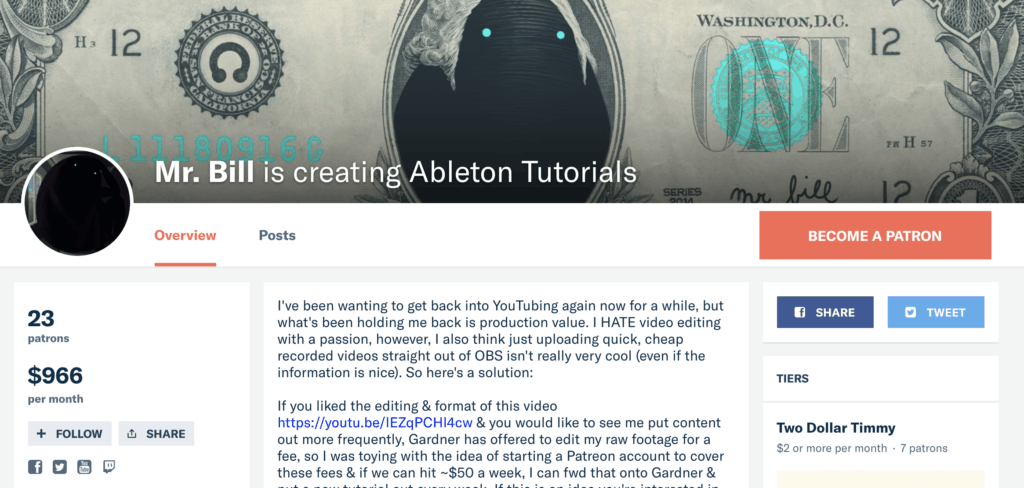
Again, keep in mind this is revenue generated by more established artists/project.
19. Mentoring/Teaching
Private lessons are a great way to share your knowledge and connect with other producers.
Who’s it for?
Producers who have a knack for teaching and are confident in their abilities.
How do you get started?
Start by leveraging your local network: reach out to your friends, post your info at local coffee shop posting boards, and post on local job sites such as Craigslist.
More established artists can look into part-time or full-time teaching positions at physical locations, or connect with a mentorship network like Pyramind or Upsound.
If you have a moderately successful artist project, you can offer 1-1 coaching directly from it.
What’s the pay?
Rates range anywhere from $25-$200 per hour.
Other Music Industry Jobs
20. Non-Production Music Industry Gigs
If you’re the type of person who simply loves being around music, it’s important to consider non-production jobs in the music industry.
While you won’t be producing, you’ll be connecting with other artists and industry experts whom you can leverage once your artist project takes off.
There are plenty of non-production music industry jobs, such as working at a record label, working at a local venue, or working for a promotion/events company.
If this interests you, make sure to check out our interview with VJ/Tour Manager Jameson Shelnut.
Final Thoughts
There are two pieces of advice I want to leave to leave you with.
The first is the idea of multiple streams of revenue. As I explained in the descriptions above, many of these streams of revenue provide great but inconsistent income. That is why it is critical to have multiple streams of revenue. In other words, a few different types of part time work that can add up to a full, sustainable income. This can help wary the storm of a bad month of royalties or sales.
For example, you could work part time at a studio and make up the rest of your income making one sample pack a month and completing 2-3 mixing and mastering gigs.
The second piece of advice is that you won’t know if each path works for you until you try it.
In order to know the right fit for you, you have to give it a shot. You might have a knack and a love for sample pack work, or maybe engineering is a surprisingly fun task for you.
Also, your goal shouldn’t be “to make a living off of music”. Your goal should be “to make a living off of music doing something you like”
Don’t just focus just on finding work, focus on finding work that you love.
New to music production? 🧑💻
Watch our Free Masterclass on how to learn electronic music production the smart way (without months of confusion & frustration) 👇

